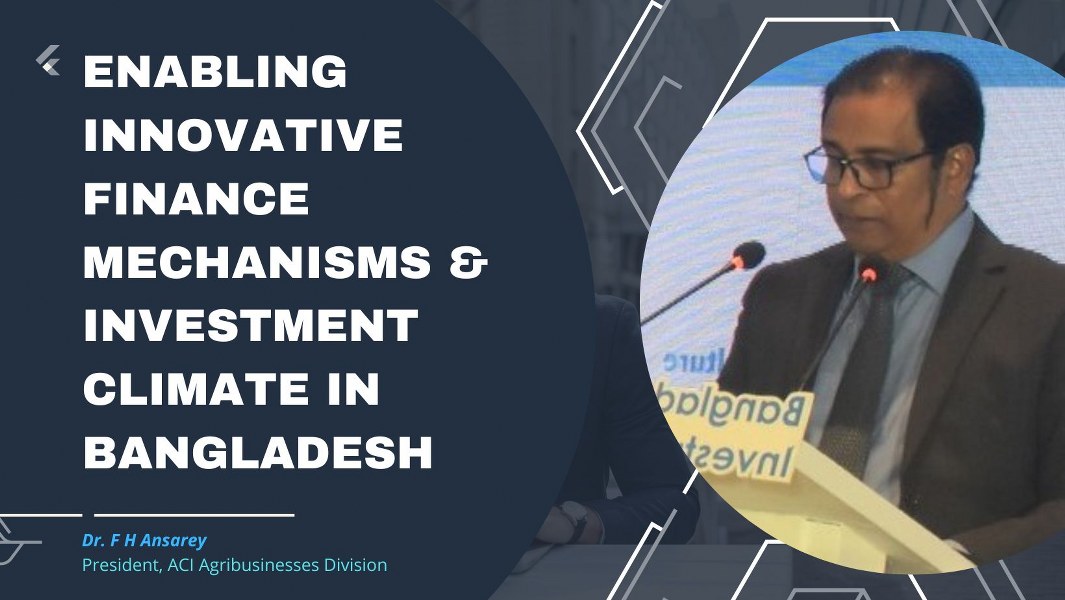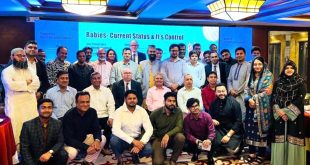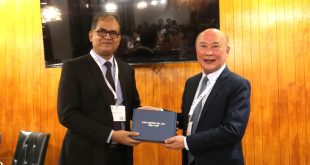 Agriculture in Bangladesh is privatized and the most of the transformational development happened by the credit scheme provided by the private sector to the farmers through dealers or directly to the farmer which enhanced the productivity and their income. So far agriculture production and productivity has been emphasized, but in each and every step of the value chain of Bangladesh agriculture, financial intervention can make a huge change.
Agriculture in Bangladesh is privatized and the most of the transformational development happened by the credit scheme provided by the private sector to the farmers through dealers or directly to the farmer which enhanced the productivity and their income. So far agriculture production and productivity has been emphasized, but in each and every step of the value chain of Bangladesh agriculture, financial intervention can make a huge change.
In Research and Development Bangladesh is vulnerable to climate change so it needs new climate smart crop & animal variety and practices through research. As private sector is dominating in agriculture, we need to develop the private sector capacity in research. Investment in research needs long-term return. So long-term low-cost fund can be provided to the private sector for capacity development like Sustainability Fund, Climate Fund, Green Fund, Green Bond and Grants.
In Input and Practices: The agri input market is huge in our country. Mostly the Private sector provides supply input and machineries in credit to the farmers through dealers, also sometimes directly to the farmers like large agri-machineries. Farmer sale their produce in the market, pays off the dealer’s credit and dealers pay to the private companies. And for machineries farmer pay directly to the company through various installments. Private sector borrow money from the bank which is costly and also the amount is limited. For the capacity development of the private sector govt. can provide long-term low-cost fund, development partners can also provide low cost working capital loans.
In Post-harvest sector like cold storage, cold chain and transportations is very poor. As the investment is significant, Govt. can build capacity and rent it to the private companies and private companies can provide post-harvest services to the farmer. This can be a PPP model. ADB, World Bank, IFC can also provide soft loans to govt. or even to the private sector directly for the development of this sector.
In Agri-Processing: In our country the street vendors are numerous, they sell their own processed food in front of school, madrasa, college, mosque, factory and the market places. They use local raw materials. If they can be provided with Micro loans, they will be more focused on hygiene and food safety which will increase buyer confidence and increase sells. Local raw materials will be used more and farmers will get better price. Thus, it will generate more income for the micro entrepreneurs.
Bangladesh is one of the largest exporters of frozen shrimps and prawns. Small holder farmers take loans with high cost which make the raw material price high and we loss competitiveness in the global market. If govt. provides long-term low-cost fund to the shrimp processor, they can lend the fund to the small holder farmers and establish the backward linkage. Thus, the benefits will be transferred to the small holder farmers and will reduce the cost of production of the raw material. Also, development partners can provide Sustainability Fund, Climate Fund, Green Fund and Grant which will improve the productivity and reduce the raw material price.
In Forward linkages: Bangladesh’s formal retail market accounted for only about 2% of the total retail market. 40% of the sales is agri-commodities. If the retail chain access soft loan, they can invest in backward linkage, farmer will get loan, sell the produce to the retailers at better price, buyer will also get fresh produces for the better price.
Agri-Entrepreneur Development: Every year about over 1 million university graduates are coming, many of them are not getting job. They can be engaged as Agri-Entrepreneur in Vegetable, Orchard, milk, poultry, cattle and aqua farming, mechanized services etc. They need training, resources and fund. The Agri-Entrepreneur Foundation (AEF) can create an eco-system for these aspiring entrepreneurs. Agri- Entrepreneur Foundation can be formed, provide training and provide SME loans to the Agri-Entrepreneur.
In conclusion, agribusiness has huge opportunity in Bangladesh specially in research and innovations, inputs and practices, post-harvest, processing and forward linkages. This opportunity can be explored through various available funds, grant, joint venture or independent operations.
Author: Dr. F H Ansarey, President, ACI Agribusinesses Division
 Agrinews24 কৃষির সাথে, কৃষকের পাশে
Agrinews24 কৃষির সাথে, কৃষকের পাশে





















